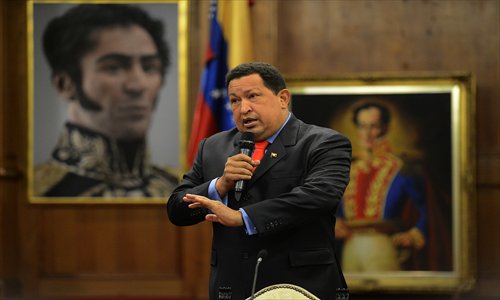Left still thriving

Venezuela's President Hugo Chavez won re-election last week in national elections after defeating challenger Henrique Caprile, capturing an estimated 54 percent of the vote.
Chavez's victory, which came after a series of elections that saw left-wing governments re-elected in South American nations in recent years, including Argentina, Brazil, Ecuador and Bolivia, affirms that left-wing governments and their policies remain popular in the region.
But analysts said they also face the challenge of how to turn their immediate successes in developing the economy in the last decade into a strategic path in the coming decades.
Social and economic success
"Venezuela will continue along the path of democratic and Bolivarian socialism of the 21st century," Chavez declared in his victory speech last week.
Chavez's third re-election victory shows that people in Venezuela still prefer the left-wing government that has managed to achieve economic success and reduced poverty and inequality by committing vast revenues from oil exports to improving people's access to housing, health care and education.
The poverty rate has dropped to 27 percent and extreme poverty to 7.7 percent since Chavez took office, when 49 percent of the population lived below the poverty line, according to the country's official figures.
The same scenario can also be seen in other Latin American nations. In Brazil, where the left-wing Workers' Party has been in power in the past decade, 25 million people have been lifted out of poverty thanks to a series of social programs.
The left-wing governments in Latin America elected since Chavez first won the presidency of Venezuela in 1998 have been much more successful than the neo-liberal governments, which preceded them in the previous two decades in at least two fields, said John Ross, visiting professor at the Antai College of Economics and Management, Shanghai Jiao Tong University.
"They have been much better at producing economic growth and ensuring that the majority of the population benefits from that growth through measures such as housing construction, increases in the minimum wage, and higher spending on health," he told the Global Times.
Ross noted that in the 1980s, the GDP per capita in the developing countries of Latin America actually declined by an average 0.8 percent a year. By 2011, after a decade of left-wing gains in Latin America, the annual average GDP per capita increase in the developing countries of Latin America was 2.5 percent.
"The left-wing parties should continue to be dominant in Latin America for a considerable period."
Independent foreign policy
Left-wing governments' decision to pursue a popular foreign policy position of national independence is another reason why they can be dominant in the region.
"The left governments in Latin America are all committed to maintaining or increasing the independence and integration of the continent," Ross noted.
Chavez's re-election, as well as elections of other left-wing leaders in recent years, including Rafael Correa, president of Ecuador in 2009, Dilma Rousseff, president of Brazil in 2010, Cristina Fernandez, president of Argentina in 2010 and Evo Morales, president of Bolivia in 2009, are likely to further beef up the role they play in regional affairs.
"The dynamic in Latin America is towards greater independence from the US as Washington continues to interfere in Latin America as shown, for example, by their support to the 2009 right-wing coup in Honduras," Ross said, adding that it was for that reason that groups of the Bolivarian Alliance for the Peoples of Our America as well as the Community of Latin American and Caribbean States were created.
"The US and Canada are not members of them. This was to escape the influence of the Organization of American States, which was dominated by the US," he said.
Immediate challenge
Despite their successful policies over the years, left-wing leaders are still faced with stiff challenges ahead, which can be highlighted by Capriles' campaign, in which the 40-year-old lawyer emphasized the seriousness of Venezuela's increasing crime rate and high inflation.
Capriles already made historic gains by winning 44 percent of the vote, the best an opposition leader achieved against Chavez in presidential elections. And the opposition has even gained more votes in the 2010 National Assembly elections.
The Guardian newspaper quoted figures from the United Nations Office on Drugs and Crime in reporting this month that in 2011, the intentional homicide rate per 100,000 people in Venezuela was 45.1 compared with 25 just 12 years earlier. Venezuela's inflation has fluctuated since Chavez came to power, according to the report. Inflation now stands at 31.6 percent compared with 23.6 percent in 1999.
The issues of crime and inflation can also be seen in some other Latin-America nations, such as Argentina and Brazil.
Professor Ross said violence and crime in Latin America is not particularly related to the left-wing governments that have been elected. "The worst problem of organized crime in Latin America was in Colombia, which until recently had a right-wing government," he said.
"But the major challenge facing the left-leaning governments in Latin America is to turn their immediate successes in developing the economy in the last decade into a strategic path that can lead to 20 years of economic growth," Ross noted.
Agencies contributed to tthis story